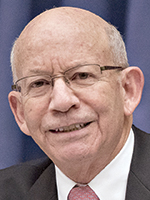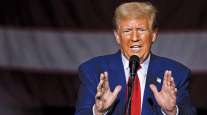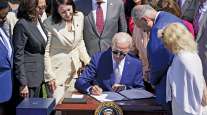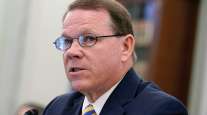Senior Reporter
Infrastructure Bill Should Pave Way for Modernization, Holmes Norton Says

WASHINGTON — In early April, on the eve of a congressional hearing on highway safety, Del. Eleanor Holmes Norton visited constituents in a revitalized neighborhood in the southwest quadrant of the nation’s capital for an update on legislative priorities.
Among the top issues on residents’ minds were traffic safety and access to transit. Holmes Norton reminded the group of about 40 residents that as chairwoman of the subcommittee on Highways and Transit in the 116th Congress, she will address matters pertaining to the city’s subway system, roads and bridges.
The April 30 announcement from House Democrats on an agreement with President Donald Trump to work on a $2 trillion infrastructure package elevated her subcommittee’s profile, and presents Holmes Norton with an opportunity to pursue a transformative vision not just for her region, but the entire country.

Holmes Norton speaks during a House Highways and Transit Subcommittee roundtable discussion in Washington in 2017. (Andrew Harrer/Bloomberg)
Advancing federal policy that would set the groundwork for building a modern landscape for the transportation network will be a priority this year for Holmes Norton, the longtime nonvoting representative from the nation’s capital. In an exclusive April 25 interview with Transport Topics from her Capitol Hill office, she explained that she wants to shift the focus from maintaining the existing design to pursuing modernizing efforts.
“We have not envisioned a transportation system since [President] Eisenhower created the nationwide system we use for interstate travel. That’s the last [time] we’ve done anything innovative,” Holmes Norton said. “[The transportation committee] has responded to the current needs, but it has not seen reason to envision the needs for the future. Well, the future is already upon us.”
For too long, she said, policy authorizers focused on fixing and maintaining the current transportation grid while neglecting to build a framework for the future. Now, she noted, rapidly evolving technology promises improvements in autonomous vehicles, which will lead eventually to cars and trucks that will rely significantly on wireless communication. Further, in the future she believes more infrastructure will be built to withstand extreme weather, and drones will improve how they deliver packages.
Thank you to @axios and @JoannMuller for a forward-looking discussion on the future of transportation. As chair of the Highways and Transit subcommittee, the key is investment in upgrades, modernization, and resilience. pic.twitter.com/gk8hQPFoR2 — Eleanor Holmes Norton (@EleanorNorton) March 28, 2019
“What we have done is to allow such deterioration to occur that we are going to have to spend money just on keeping billions of dollars we have already invested in transportation — roads, bridges and highways,” she said.
The chairmanship of the Highways and Transit Subcommittee allows for significant influence over provisions related to autonomous vehicles, intelligent infrastructure and complete street designs. Such concepts, she said, could be useful in reducing congestion, as well as enhancing the safety of motorists, cyclists and pedestrians.
“We need to look at everything about how roads are designed, about the kinds of vehicles that they must accommodate,” she added.

DeFazio
The chairman of the full transportation panel, Rep. Peter DeFazio (D-Ore.), has expressed an interest in taking up big-picture infrastructure legislation during the next few weeks. A consensus between Democrats and Republicans on ways to fund a massive infrastructure package has yet to be reached. Holmes Norton’s advice for her colleagues is to embrace an age-old concept: compromise.
With each party leaning in separate directions over funding approaches, finding areas of compromise will be vital. For Holmes Norton, the type of compromise she envisions could entail the consideration of some sort of a fuel tax increase that would pave the way for the adoption of a nationwide vehicle-miles-traveled system. Over a certain time frame, a transition away from the fuel tax could be achievable.
“That’s the kind of compromise I’d be very interested in discussing,” she said.
Ultimately, however, any funding portfolio for a multiyear transportation bill would have to include the fuel tax, the chairwoman said. A few top Democrats have endorsed raising federal gas and diesel taxes. On the other side of the aisle, most Republicans continue to treat the consideration of such a tax increase with trepidation.
However, more than two-thirds of states have raised their fuel taxes in recent years, and Holmes Norton would welcome a vote to see if Republicans from states that increased fuel taxes would support doing so federally.
“I think the Democrats have got to take the lead on this,” she said. “Call the bluff of the Republicans in Congress, ’cause their own states have raised the gas tax.”
On the question of timing, she noted crafting massive legislation requires patience, and said a self-imposed August deadline for finalizing an infrastructure package seems ambitious. Recalling the most recent highway policy measure, she said, “In easier times we often took two years. Last time we took two years on a bill, [but] the issues are much harder this time.”




